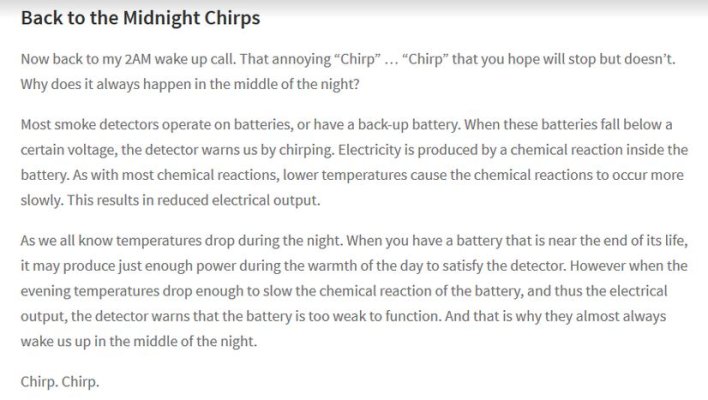mpeirce
Thinks s/he gets paid by the post
Last night another of our smoke detectors started it's battery-needs-replacing beeping at 2AM. It was especially fun since I accidentally pulled down one of two smoke detectors that is tied into our alarm system (it wasn't the unit beeping, but 2AM...) so it set off the house alarm and our monitoring company called. Fun at 2AM...
We've had the house for 18 years now and it's (past) time to replace the 9 smoke alarms that came with the house. We do know that at least the one by the kitchen still detects smoke ;-)
I was set to buy a six pack of the First Alert 9210 wired + battery units on Amazon along with three First Alert SC05CN Wired + battery smoke + CO detector units.
The 9210 are basic ionization sensor smoke alarms, while the SC05CN's add a carbon monoxide sensor and the smoke sensor is photoelectric (supposedly better). I'd put one of these on each floor.
But today I was at Costco and noticed they had sealed battery First Alert units that are also photoelectric for only a $1 more than my six pack 9210's.
How do people feel about sealed battery vs replaceable batteries. Sealed seems better to me, but what do I know?
Likewise, does anyone really know if photoelectric sensors are better than ionization sensors?
Thought I'd ask before I bought these.
We've had the house for 18 years now and it's (past) time to replace the 9 smoke alarms that came with the house. We do know that at least the one by the kitchen still detects smoke ;-)
I was set to buy a six pack of the First Alert 9210 wired + battery units on Amazon along with three First Alert SC05CN Wired + battery smoke + CO detector units.
The 9210 are basic ionization sensor smoke alarms, while the SC05CN's add a carbon monoxide sensor and the smoke sensor is photoelectric (supposedly better). I'd put one of these on each floor.
But today I was at Costco and noticed they had sealed battery First Alert units that are also photoelectric for only a $1 more than my six pack 9210's.
How do people feel about sealed battery vs replaceable batteries. Sealed seems better to me, but what do I know?
Likewise, does anyone really know if photoelectric sensors are better than ionization sensors?
Thought I'd ask before I bought these.

